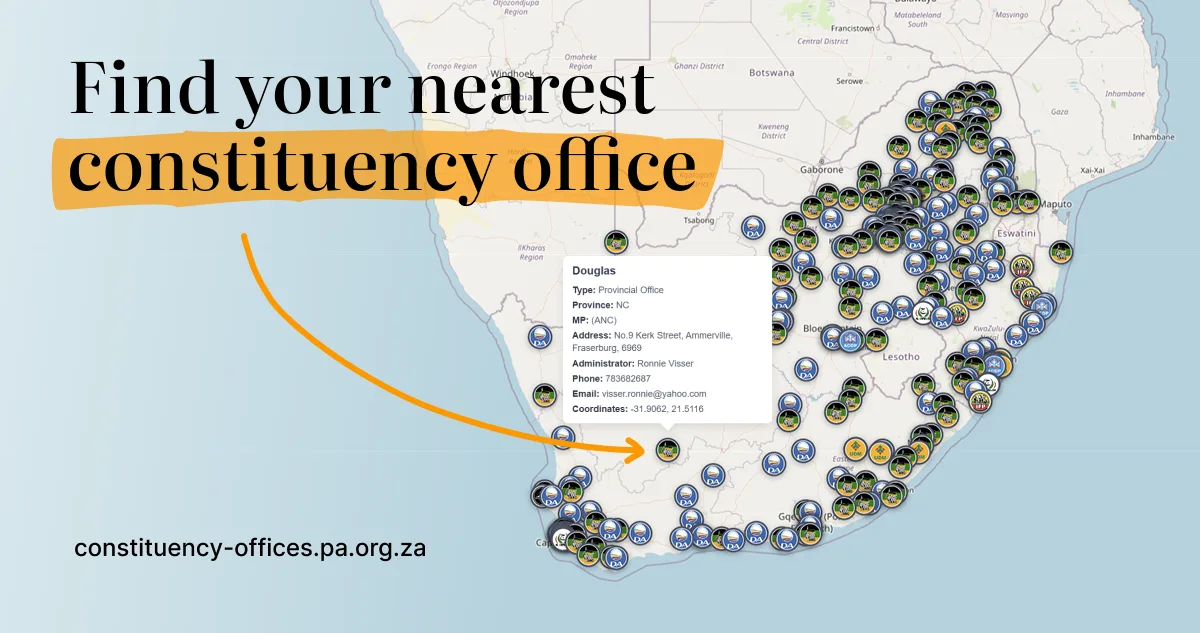OUTA's Assessment of South Africa's Parliament against the "Indicators of a Democratic Parliament".

About this assessment
The Indicators for Democratic Parliaments (IPDs) is an initiative developed by the Inter-Parliamentary Union (IPU) in partnership with leading organisations from the parliamentary community. The IDPs are designed as a comprehensive self-assessment tool that aids parliaments in evaluating their capacity, performance, and practice against already established democratic standards. The IDPs are also developed to support parliaments’ learning and development that are brought about through key questions of effectiveness, accountability, transparency as well as various characteristics. For the purposes of ParliMeter, the assessment was external, conducted from a civil society perspective.
The IDPs are broken down into 108 dimensions that are assigned assessment criteria. There is a total of 500 assessment criteria. The 7 targets include: Effective parliament, Accountable parliament, Transparent parliament, Responsive parliament, Inclusive parliament, Participatory parliament, and Representative parliament.
These assessments have been compiled by the Organisation Undoing Tax Abuse (OUTA) as an independent civil society evaluation of South Africa parliament, based on the IDP framework. This assessment aims to critically examine parliament’s performance in key areas of democratic governance, specifically its effectiveness, accountability, transparency, and responsiveness in order to determine how well it fulfils its constitutional mandate and serves the public interest.
Legend for assessment scores
Scores are rounded to the nearest grade even if not presented as such
Summary of assessment results

Target 1: Effective Parliament
3.2
About this target
The effective parliament is based on the effective organisation of business with regards to the democratic norms and values. This target includes the 11 indicators: Parliamentary autonomy, members of parliament (MPs), parliamentary procedures, parliamentary organisation, administrative capacity and independence, law-making, oversight, budget, representative role of MPs, relations with other branches of government, and key parliamentary powers. An effective parliament has mechanisms and resources that ensures their own independence and have access to non-partisan professional staff that are separate from those in main civil services. Parliaments need to effectively draw up laws, hold governments accountable and be a national forum for concerning issues. They cooperate and consult effectively with regional authorities, in order to draw up policies that are driven by local needs as well as be involved in international affairs.
OUTAs findings
- Parliamentary Autonomy and Political Dynamics: While the Constitution guarantees parliamentary independence, political dominance by the ruling party often undermines autonomy — especially in oversight. Reforms are needed to strengthen separation of powers.
- Legislative and Oversight Effectiveness: Despite a strong legal framework, inefficiencies, political tension, and limited resources hinder timely reforms and weaken parliament’s ability to hold the executive accountable.
- Resource Allocation and Inclusivity: Smaller parties and independents struggle to access resources, limiting their participation. Better resource allocation and infrastructure can improve efficiency and inclusivity.
- MPs and Professional Development: MPs face gaps in training and unequal development opportunities. Mandatory induction and continuous training are needed to build capacity and ensure effectiveness.
- Transparency and Public Engagement: Although sessions are public, there is limited transparency in decision-making and record access. Improved openness is required.
- Financial and Administrative Independence: Legal protections exist, but underfunding hampers operations. Increased funding and better financial oversight are needed to protect independence.
- Emergency and Crisis Procedures: Crisis management protocols need strengthening to ensure smooth parliamentary operations during emergencies.
- Parliamentary Calendar and Agenda-Setting: Poor coordination of the legislative calendar affects MPs’ ability to manage time and resources. Better planning is needed, especially during peak periods.
Breakdown of indicators by dimension and criteria

Target 2: Accountable parliament
3.0
About this target
The accountable parliament emphasises the responsibility of parliament and its members regarding their conduct's integrity. Two key indicators are identified: Parliamentary Ethics and Institutional Integrity. Accountable parliaments feature members who are responsible to their electorate for both their performance and ethical conduct. There should be real possibilities for electoral sanctions, established standards, and enforceable codes of conduct for MPs. Members receive adequate compensation and must disclose their interests as well as income and have limitations on election spending. Furthermore, parliaments regularly and transparently report on their institutional performance.
OUTAs findings
- Anti-Corruption Measures: South Africa has a strong legal anti-corruption framework (e.g. PCCAA, Public Protector), but enforcement is weak due to political interference. Parliamentary committees face resource and political constraints that hamper effective investigations.
- Transparency Gaps in Financial Reporting: While some financial data (like MPs' salaries) is available, detailed expenses and procurement data are hard to access. Lack of real-time, user-friendly reporting limits public scrutiny.
- Regulation of Lobbying: There’s no legal framework or lobbyist register in SA, making lobbying activities opaque and legislative influence difficult to track.
- Public Engagement and Participation: Public engagement exists but is inconsistent and reactive. More structured, inclusive channels are needed for meaningful citizen involvement in decision-making.
- Institutional Independence: Oversight bodies lack the autonomy to act without political pressure, leading to weak accountability and eroding public trust in parliament’s impartiality.
- Parliamentary Ethics: Despite robust frameworks like PCCAA and UNCAC, enforcement is inconsistent. Committees such as SCOPA are hindered by political interference and resource limits, reducing oversight impact.
- Institutional Integrity and Professionalism: While ethical codes exist, enforcement is uneven. Training gaps remain for MPs and staff, especially in complex areas like legislative drafting and ethical decision-making.
- Transparency in Parliamentary Operations: Although platforms like the website and e-Tender portal exist, many records are inaccessible or in unusable formats. Financial reporting lacks clarity and regular updates, limiting public trust.
Breakdown of assessment by dimension and criteria

Target 3: Transparent parliament
3.2
About this target
A transparent parliament that is open to the nation and conducts its business with transparency. Target three comprises of three key indicators: transparency of parliamentary processes, parliamentary communication and outreach, and access to parliament. Open parliaments prioritise transparency in their operations, ensuring that proceedings are accessible to the public and media. They publicise debates in advance and make relevant documents available online. Furthermore, open parliaments typically have dedicated public relations teams and effectively leverage technology to disseminate information to the public.
OUTAs findings
- Transparency of the Budget Cycle: Budget formulation and approval follow legal frameworks, but delays and inaccessible documents hinder public oversight and limit broader understanding of financial decisions.
- Legal Framework for Transparency: Parliament has strong transparency laws like PAIA, granting public access to proceedings and documents. However, inconsistent application, delays, and incomplete sharing reduce their effectiveness.
- Public Participation and Engagement: Hearings and outreach programs provide opportunities for engagement, but rural and marginalised groups are often excluded. Engagement quality is uneven, requiring more targeted and consistent efforts.
- Digital Platforms and ICT Resources: Parliament invests in ICT systems, yet limited resources prevent scaling advanced tools like real-time bill tracking. Rural digital divides further restrict access and participation in legislative processes.
- Accessibility of Parliamentary Processes and Public Access to Legislative Information: Physical accessibility has improved through ramps and elevators, but citizens in remote areas still struggle to access proceedings and related resources equally. Bills, voting records, and reports are published, but technical language and complex formats make it difficult for ordinary citizens to interpret and use this information.
- Explanatory and Educational Materials and Social Media and Public Outreach: Parliament produces guides and explanatory content, but these are too infrequent and do not reach underserved communities. Simpler, more interactive resources would strengthen public understanding. Parliament is active on social media, but engagement is often reactive. More proactive, interactive content such as live sessions could better connect with citizens, especially younger audiences.
- Media Access to Parliamentary Proceedings: Media is generally granted access, yet overcrowding during major debates and limited facilities constrain coverage, particularly for smaller and independent outlets.
- Evaluation and Continuous Improvement: Transparency practices are reviewed, but feedback from communities is not consistently integrated. A more structured approach would improve monitoring and responsiveness.
Breakdown of assessment by dimension and criteria

Target 4: Responsive parliament
2.6
About this target
A responsive parliament emphasises addressing public concerns and policy issues. This indicator prioritises valuing public input as an indicator. Accessible parliaments actively involve citizens in their processes, providing multiple avenues for individuals to engage with their MPs and ensuring effective consultation before legislation is enacted. Key features of accessibility include the public's right to request action on specific issues and to file complaints regarding grievances. Furthermore, interest groups are permitted to lobby within established legal frameworks that promote transparency in these interactions. There are 3 dimensions under this indicator: Responding to Public Concerns, Responding to Emerging Policy Issues, and Leaving No One Behind and the 2030 Agenda for Sustainable Development.
OUTAs findings
- Parliament’s Role in National SDG Reporting: Parliament participates in SDG coordination but lacks a formalised role in reviewing or shaping national UN reports. Stronger collaboration with CSOs and clearer accountability are needed to strengthen impact.
- Limited Access to Participation Mechanisms: Parliament offers petitions, hearings, and committee engagements, but rural and marginalised citizens often struggle with language barriers, digital divides, and low civic awareness, limiting meaningful participation.
- Delays in Processing Public Input: Committees receive public submissions, yet delays are frequent and there is little visibility on how inputs are processed. The lack of real-time tracking or public updates weakens confidence in parliamentary responsiveness.
- Weak Feedback to Citizens: While reports and debates may reflect public input, citizens and CSOs rarely get direct feedback on their contributions. This is especially evident in petitions and hearings on issues like health, housing, and local governance.
- Political Barriers to Urgent Action: Rules allow urgent debates and motions, but political contestation often delays their use. Opposition-led calls on crises such as water shortages in KwaZulu-Natal or the energy crisis were frequently blocked or deprioritised.
- Inconsistent Executive Oversight: Committees hold oversight powers on executive action during crises like Covid-19 or Eskom load shedding, but majority-party dynamics and limited staff capacity often delay or dilute effective oversight.
- Ineffective Public Communication: Parliament communicates through social media, its website, and TV, yet awareness of legislative developments remains low. Limited use of indigenous languages and weak outreach in informal settlements further exclude many citizens.
- Partial Integration of SDGs: Parliament engages with SDGs and the NDP, but legislation is not consistently assessed against sustainability goals. Committees often lack the tools and expertise to apply SDG-aligned evaluations.
Breakdown of assessment by dimension and criteria
More assessment targets to follow
This is a very involved assessment process and, as such, takes quite a while to complete. OUTA's team felt it was important to release the assessments, their progress and their recommendations as they are completed. We will be sure to announce when further targets are released.
If you have feedback or comments on our assessment, or would like to get involved or get access to a copy of our AirTable assessment form template, please get in touch with OUTA.
Our latest stories

Strengthening transparency & responsiveness: What our latest IDP assessments reveal about Parliament

Know Your MP: Find Your Constituency Office and Make Your Voice Heard

South Africa’s 2025 BRRR cycle: when oversight meets reality

Here’s OUTA’s annual assessment of Parliament

Global Ethics Day 2025 and South Africa's Parliament

What goes into Monitoring Parliament? Behind the scenes with PMG’s Monitors!
Latest data stories
Work with us
We are looking for resource and data partners!
If you or your organisation would like to contribute or collaborate, please get in touch.